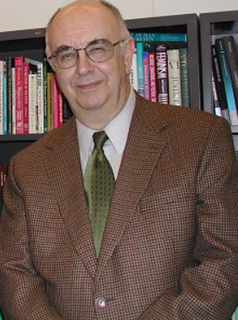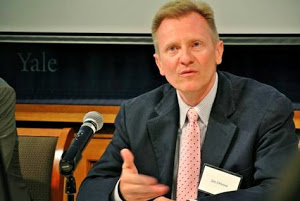In environmental philosophy, environmental ethics is an established field of practical philosophy "which reconstructs the essential types of argumentation that can be made for protecting natural entities and the sustainable use of natural resources." The main competing paradigms are anthropocentrism, physiocentrism, and theocentrism. Environmental ethics exerts influence on a large range of disciplines including environmental law, environmental sociology, ecotheology, ecological economics, ecology and environmental geography.

Mary Beatrice Midgley was a British philosopher. A senior lecturer in philosophy at Newcastle University, she was known for her work on science, ethics and animal rights. She wrote her first book, Beast and Man (1978), when she was in her late fifties, and went on to write over 15 more, including Animals and Why They Matter (1983), Wickedness (1984), The Ethical Primate (1994), Evolution as a Religion (1985), and Science as Salvation (1992). She was awarded honorary doctorates by Durham and Newcastle universities. Her autobiography, The Owl of Minerva, was published in 2005.
Moral agency is an individual's ability to make moral choices based on some notion of right and wrong and to be held accountable for these actions. A moral agent is "a being who is capable of acting with reference to right and wrong."

Environmental philosophy is a branch of philosophy that is concerned with the natural environment and humans' place within it. It asks crucial questions about human environmental relations such as "What do we mean when we talk about nature?" "What is the value of the natural, that is non-human environment to us, or in itself?" "How should we respond to environmental challenges such as environmental degradation, pollution and climate change?" "How can we best understand the relationship between the natural world and human technology and development?" and "What is our place in the natural world?" Environmental philosophy includes environmental ethics, environmental aesthetics, ecofeminism, environmental hermeneutics, and environmental theology. Some of the main areas of interest for environmental philosophers are:

James Webster Rachels was an American philosopher who specialized in ethics and animal rights.

James R. Otteson is an American philosopher and political economist. He is the John T. Ryan Jr. Professor of Business Ethics at the University of Notre Dame. Formerly, he was the Thomas W. Smith Presidential Chair in Business Ethics, Professor of Economics, and executive director of the Eudaimonia Institute at Wake Forest University. He is also a Senior Scholar at The Fund for American Studies in Washington, D.C., a Research Professor in the Center for the Philosophy of Freedom and in the Philosophy Department at the University of Arizona, a Visitor of Ralston College, a Research Fellow for the Independent Institute in California, a director of Ethics and Economics Education of New England, and a Senior Scholar at the Fraser Institute. He has taught previously at Yeshiva University, New York University, Georgetown University, and the University of Alabama.

Mylan Engel Jr. is a full professor of philosophy at Northern Illinois University in DeKalb.

Geoffrey Sayre-McCord is an American philosopher who works in moral theory, ethics, meta-ethics, the history of ethics, and epistemology. He teaches at the University of North Carolina, Chapel Hill. He is also the director of the Philosophy, Politics and Economics Society.
David Edward Cooper is Emeritus Professor of Philosophy at Durham University.
İbrahim Özdemir is a Kurdish philosopher, academic and an Islamic environmentalist. He is a professor of philosophy at Uskudar University and Director General of the Department of Foreign Affairs, the Ministry of National Education, Turkey.
John Cottingham is an English philosopher. The focus of his research has been early-modern philosophy, the philosophy of religion and moral philosophy. He is a Professor Emeritus of Philosophy at the University of Reading, Professorial Research Fellow at Heythrop College, University of London, and Honorary Fellow of St John's College, Oxford. He is also a current Visiting Professor to the Philosophy Department at King's College, London.

Alice Crary is an American philosopher who currently holds the positions of University Distinguished Professor at the Graduate Faculty, The New School for Social Research in New York City and Visiting Fellow at Regent's Park College, University of Oxford, U.K..
Lori Gruen is an American philosopher, ethicist, and author who is the William Griffin Professor of Philosophy at Wesleyan University in Middletown, Connecticut. Gruen is also Professor of Science in Society, and Professor of Feminist, Gender and Sexuality Studies at Wesleyan.
Clare Palmer is a British philosopher, theologian and scholar of environmental and religious studies who is currently a professor in the Department of Philosophy at Texas A&M University. She has previously held academic appointments at the University of Greenwich, the University of Stirling, Lancaster University and Washington University in St. Louis, among others. Palmer is known for her work in environmental and animal ethics.
Jessica Pierce is an American bioethicist, philosopher, and writer. She currently has a loose affiliation with the Center for Bioethics and Humanities, University of Colorado Denver, but considers herself mostly independent. She has previously worked variously at the University of Colorado Boulder, the University of Nebraska Medical Center, and Randolph-Macon Women's College, having studied at the University of Virginia, Harvard Divinity School and Scripps College.
Gary Edward Varner is an American philosopher specializing in environmental ethics, philosophical questions related to animal rights and animal welfare, and R. M. Hare's two-level utilitarianism. He is a professor in the department of philosophy at Texas A&M University, and has been based at the university since 1990. He was educated at Arizona State University, the University of Georgia and the University of Wisconsin–Madison; at Madison, where he was supervised by Jon Morline, he wrote one of the first doctoral theses on environmental ethics. Varner's first monograph was In Nature's Interests?, which was published by Oxford University Press in 1998. In the book, Varner defended a form of biocentric individualism, according to which all living entities have morally considerable interests.
Jeffrey Raymond Sebo is an American philosopher. He is clinical associate professor of environmental studies, director of the animal studies MA program, and affiliated professor of bioethics, medical ethics, and philosophy at New York University. In 2022, he published his first sole-authored book, Saving Animals, Saving Ourselves.

The predation problem or predation argument refers to the consideration of the harms experienced by animals due to predation as a moral problem, that humans may or may not have an obligation to work towards preventing. Discourse on this topic has, by and large, been held within the disciplines of animal and environmental ethics. The issue has particularly been discussed in relation to animal rights and wild animal suffering. Some critics have considered an obligation to prevent predation as untenable or absurd and have used the position as a reductio ad absurdum to reject the concept of animal rights altogether. Others have criticized any obligation implied by the animal rights position as environmentally harmful.
Roger S. Gottlieb is professor of philosophy and Paris Fletcher Distinguished Professor in the Humanities at Worcester Polytechnic Institute. He has written or edited 21 books, including two Nautilus Book Awards winners, and over 150 papers on philosophy, political theory, (environmental) ethics, religious studies, (religious) environmentalism, religious life, contemporary spirituality, the Holocaust, and disability. He is internationally known for his work as a leading analyst and exponent of religious environmentalism, for his passionate and moving account of spirituality in an age of environmental crisis, and for his innovative and humane description of the role of religion in a democratic society.
Catia Faria is a Portuguese moral philosopher and activist for animal rights and feminism. She is assistant professor in Applied Ethics at the Complutense University of Madrid, and is a board member of the UPF-Centre for Animal Ethics. Faria specialises in normative and applied ethics, especially focusing on how they apply to the moral consideration of non-human animals. In 2022, she is expected to publish her first book Animal Ethics in the Wild: Wild Animal Suffering and Intervention in Nature.







